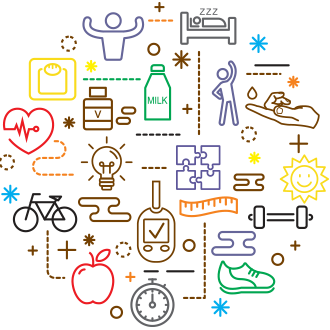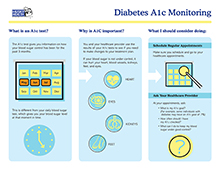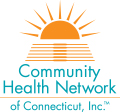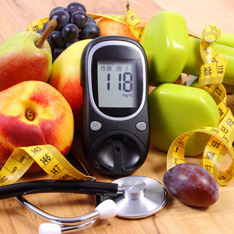Diabetes: Finding and Getting to My Healthy Range
Diabetes is a condition that can cause your blood sugars to be in an unhealthy range.
We understand that living with diabetes can be difficult. You don’t have to figure it all out on your own. With the right tools and support, you can feel your best and spend more time doing the things that are important to you.
List of topics:
Understanding Diabetes

Type 1 Diabetes Your body has stopped making insulin.
Type 2 Diabetes Your body is having a hard time making the right amount of insulin or using insulin correctly.
When your blood sugars are in a healthy range you will:
- Be better able to do the things that are important to you
- Feel your best
- Reduce your chances of having problems with your vision and ability to see things clearly
- Keep your heart, kidneys and blood vessels as healthy as possible
- Be better able to care for your family
When your blood sugars are not in a healthy range you will:
- Lacks the energy needed to keep your body working properly
- Not feel your best
- Be more likely to have problems with your eyes, heart, and kidneys
Finding Your Healthy Range for Blood Sugar Numbers
It is important to know that every person with diabetes is unique. You and your healthcare provider should pick a healthy blood sugar range that is right for you. Think of your healthy blood sugar range as the target you should aim for. The two ways to know if your blood sugar is in a healthy range are with Blood Sugar Testing and A1c monitoring.
Blood Sugar Testing
The American Diabetes Association suggests the following targets for most non-pregnant adults with diabetes. You and your provider can decide on the right targets for you.
| When to Test | Blood Sugar Target Range |
|---|---|
 Before meals |
80-130 mg/dl |
 1-2 hours after meals |
Less than 180 mg/dl |
What should you consider doing?
- Talk to you healthcare provider about your healthy blood sugar range and what you can do if your blood sugars are not in a healthy range
- Know your blood sugar ranges by testing your blood sugars as often as your provider recommends
- Bring your meter and a log of your blood sugars to all of your provider visits
The A1c Test
The other important blood sugar test to know is the A1c test. Your A1c result gives you a good idea of how well your diabetes treatment plan is working.
The American Diabetes Association suggests an A1c level of 7% for most nonpregnant adults. You and your provider can decide on the right target for you.
What should you consider doing?
- If you don’t know your A1c level, now is a good time to think about getting your A1c checked. Use the guide below to help you decide when to schedule a visit to have your A1c checked.

To save and print this guide so you can bring it with you to your next appointment, click here.
What is important to you?
Living with diabetes is not always easy. Knowing what is important to you can help you develop the right diabetes treatment plan for you. When you know and value the things that are important to you, it is easier for you to follow your plan.
Use the list below to pick what is important to you:
- Being able to take care of my family
- Being able to start a family
- Being able to have a healthy pregnancy
- Helping my children grow up
- Feeling my best
- Being able to do the things I like despite my diabetes
- Being able to see clearly (having good eyesight)
- Having the energy I need to do the things that are important to me
- Reducing the chances of having problems with my heart and kidneys
- Protecting myself from low blood sugars
- Protecting myself from high blood sugars
What should you consider doing?
Now that you know what’s important to you, write it down in a place where you will see it.
This could be on your:
- phone background
- a note on your refrigerator
- with your blood sugar testing kit
It will help remind you why you are working so hard to keep your blood sugar in a healthy range.
What gets in the way of taking care of your diabetes?
Each person has different things that get in the way of taking care of their diabetes. The first step is to identify them. What gets in your way or makes it hard for you to take care of your diabetes?
The following list may help you get started:
Download: What Gets in Your Way?What should you consider doing?
Help is available to help you overcome these barriers. Make a call to one of these programs to get you started:
- HUSKY Health Intensive Care Management (ICM) has nurses who will take the time to find out what is important to you and find you the services that will help you feel your best. If you are ready to enroll in ICM, call 1.800.859.9889 x2023 or visit our ICM page to learn more.
- 2-1-1 is your connection to all of the local services you may need: food, housing, child care, and much more. Dial 2-1-1 or visit the 2-1-1 website
- If you have a health question and your provider or your provider’s answering service is not available, you can call the 24/7 Nurse Helpline at 1.800.859.9889
Preparing to Make a Change
Being as healthy as possible with diabetes usually involves the following self-care behaviors:
- Healthy Eating
- Being Active
- Taking Medications
- Monitoring
- Reducing Risks
- Problem Solving
- Healthy Coping
What should you consider doing?
Think about the self-care behaviors listed on the left. What would you like to know more about or do differently? Use this list to help you get started.
- Eat smaller portions of food or try healthy and delicious recipes
- Find new, fun ways to be more active
- Know more about different kinds of diabetes medications
- Learn about ways to monitor your diabetes
- Get tips on how to reduce your risk of heart and kidney problems
- Know more about how to take care of your diabetes when you are sick
- Handle unexpected changes in your blood sugar
- Cope with stress and feeling overwhelmed
Making the Right Plan for You
Once you decide what would like to work on, you can set a goal. Goals give you a clear picture of what is important to you. You are more likely to reach your goals when you write them down and have a good plan.
Remember to start with small changes in your self-care and take it one step at a time!
This portion of the HUSKY Health website is managed by Community Health Network of Connecticut, Inc.®, the State of Connecticut’s Medical Administrative Services Organization for the HUSKY Health Program. For the general HUSKY Health website gateway, please visit portal.ct.gov/husky. HUSKY Health includes Medicaid and the Children’s Health Insurance Program, and is administered by the Connecticut Department of Social Services.


